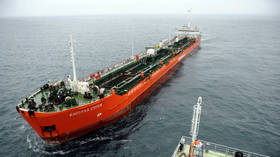British boats assist in transporting Russian oil – media

British-crewed ships have participated in transporting Russian crude oil to Asia, The Independent revealed on Friday, claiming that the “small part” they play in the chain indicates “huge holes” in the Western sanctions on Moscow.
A joint investigation of The Independent and the website Global Witness found that at least twice in May, British-crewed vessels based in the Suffolk town of Southwold “sped out from nearby harbours to help transfer Russian oil between vast tankers.”
One boat was sent by a British company called STS Marine Transfers to move 14,000 tonnes of Russian fuel oil from one foreign tanker to another, while another, a catamaran called Endeavor that belongs to a company known as Wood Marine, delivered supplies and took the tankers’ crews ashore. The oil transfers took place outside UK territorial waters.
“After refuelling, the two tankers carried 165,000 tonnes of Russian fuel oil – worth more than £165m – onwards to the Persian Gulf and Singapore,” The Independent said.
According to the outlet, the transfers “are one link in an international chain” that has helped Russia to quickly shift oil sales to Asia, as European buyers cut back.
When approached by the journalists, one of the operators of the British ships said their boats just provide “a taxi service at sea,” and therefore there is no obligation to check where the oil comes from. Another company said it was complying with all international laws and regulations, and had not renewed its contract with cargoes originating from Russia.
“The exact number of transfers of Russian oil that have taken place off Britain’s coast is not known. They are not illegal, and there is nothing stopping British companies from taking part, but they are an indication of huge holes in Western sanctions,” the investigators claim.
They added that, as “global shipping is among the most opaque and least accountable industries in the world,” and many things are happening “beyond the reach of individual nation states,” the industry significantly undermines Western countries’ ability to put pressure on Russia.
The G7 has said it is aware of the problem and plans to introduce a price cap which would allow Western nations to curb Moscow’s oil revenue. The bloc has also been trying to lure China and India, major buyers of Russian crude, into joining the deal.
In response to the Russian military operation in Ukraine, Western countries imposed harsh sanctions on Moscow, including full and partial bans on its oil, gas, and coal. Russian President Vladimir Putin previously accused EU leaders of committing economic suicide by attempting to give up Russian energy.













